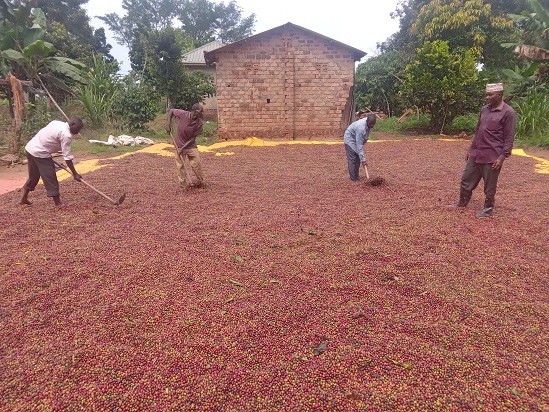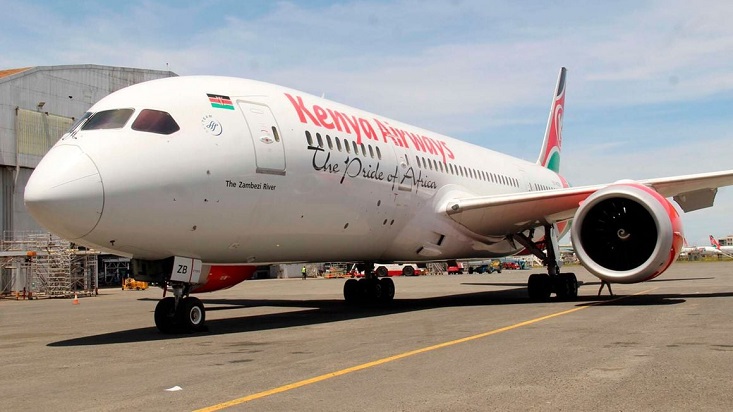Uganda earns big from coffee exports. Minister Tumwebaze says falling coffee prices is not a result of any government policy/intervention
The Government of Uganda through the Ministry of Agriculture, Animal Industry and Fisheries (MAAIF) has finally spoken out on the falling coffee prices that have raised concerns among the stakeholders.
In a statement signed off by Frank K. Tumwebaze, the Minister of Agriculture, Animal Industry and Fisheries, Government says in the past one month, Uganda has witnessed declining coffee prices resulting from global reduction in coffee prices.
According to the market analysis report from MAAIF (27th June 2025), at farm gate level, Robusta (FAQ) is selling between UGX 10,000–11,000 while Robusta (Kiboko) ranges between UGX 5,000–5,500.
Arabica (parchment) is trading between UGX 14,000–15,000 while Drugar coffee (clean) being sold at UGX 14,000–14,000.
Tumwebaze says the high prices observed over the past two years were due to a combination of factors including increased global demand, adverse weather conditions affecting production, and rising costs throughout the supply chain.
“Droughts, floods, and extreme temperatures in key coffee-growing regions like Brazil and Vietnam had negatively impacted coffee yields, reducing the amount of coffee available for export. This situation affected mostly Robusta coffee hence making our Robusta highly demanded globally, thus the high prices farmers and other value chain actors have enjoyed until recently,” Tumwebaze’s statement reads in part.
Why is there a decline in the global coffee prices?
First of all, Tumwebaze says, coffee is traded globally at the coffee stock exchange. On international markets, he says, Arabica coffee is mainly traded on the Intercontinental Exchange (ICE) Futures based in New York, while Robusta is traded on the London International Financial Futures and Options Exchange (LIFFE).
“Coffee is traded through futures contracts, which are agreements to buy or sell a specific quantity of coffee at a predetermined price at a future date.
These contracts allow coffee producers and traders to hedge against price fluctuations, ensuring some economic stability. Investors also use futures contracts to speculate on coffee price movements,” Tumwebaze explains.
He adds: “Like any stock or commodity traded on the stock exchange, coffee prices fluctuate on the charts, depending on a series of factors including climatic conditions and extreme weather events, agricultural policies of producing countries, growth or decline in global demand, market speculation and transport difficulties, such as the current blockade of ships in the Red Sea due to wars (shipping disruptions through the Suez Canal due to rebel attacks) among others.
Therefore, the Coffee prices we have observed over the past few weeks have been due to global market forces rather than government policies or interference.”
He went on to give a detailed explanation on the factors that have led to a sharp decline in coffee prices.
Brazilian production
MAAIF says the weather conditions in Brazil have recently improved leading to increased harvest expectations and are greatly contributing to the decline of coffee prices.
“As a result, coffee harvests are expected to be of good quality and plenty, which has offered a relief to the industry that had feared supply shortage due to drought. It is forecasted that Brazil’s Coffee Production will increase by 0.5% to 65M bags in 2025/26 while Vietnam’s will increase from 29M bags to 31M bags,” MAAIF says in a statement signed off by Minister Tumwebaze.
Increase in the supply of coffee
MAAIF adds that there is currently a rise in global coffee production, particularly Robusta, which has led to an oversupply in the market, driving down the prices. Vietnam has recently seen a significant increase in exports, further contributing to the downward pressure on prices.
Currency volatility
Government further says fluctuations in currency exchange rates, especially the US dollar, is currently impacting on the profitability of coffee exports and hence reducing the market prices.
Demand for coffee
According to United States Department of Agriculture, World Markets and Trade Report-June 2025, the world coffee production for 2025/26 is forecasted to be 4.3 million bags higher than the previous year reaching a record 178.7 million due to continued recovery in Vietnam and Indonesia as well as record output in Ethiopia.
World coffee bean exports are forecasted to be 700,000 bags higher reaching 122.3 million as gains from Vietnam, Ethiopia, and Indonesia more than offset losses from Brazil and Colombia. Global consumption is forecast at a record 169.4 million bags.
Market Speculation
MAAIF says traders and investors often buy and sell coffee futures based on anticipated market movements, which can lead to price volatility.
According to a Global Coffee Report, ICE Coffee Futures contract on June 17, 2025, reached its lowest point since January.
“Coffee price fluctuations are however not new like for any other commodity. Available data shows that over the past 10 years, average coffee export prices have been fluctuating between USD 1.53 per kilogram and USD 3.11 per kilogram, with FY 2020/21 recording the lowest price of USD 1.53/kg,” MAAIF says.
Conclusion
In conclusion, MAAIF says coffee is an internationally traded commodity and traded on stock market.
“A decline in coffee prices can occur due to a number of factors as already explained above. It is, therefore, NOT as a result of any government policy/intervention. Although currently prices are anticipated to continue declining globally in a few months to come, our coffee industry is on track as you have seen from the monthly report for May 2025, which shows we exported 7.43 million bags worth US$ 2.09 billion for the year June 2024 to May 2025 compared to 6.08 million bags worth US$1.08 billion in the previous year (June 2023 – May 2024). This represents an increase of 22 % and 93.6% in quantity and value respectively,” Tumwebaze explains.
He adds that with the peak harvest season in Brazil ending in early July, and the Robusta harvest season in India and Vietnam coming to end in mid-July, there is a high likelihood that the farm gate prices
for Uganda’s coffee will slightly improve from mid-July to late August.
According to the quality Coffee Institute, CQI, Uganda is now positioned 3rd Quality coffee producer.
“I, therefore, call upon all coffee farmers across the country to remain calm, plant more coffee and ensure good quality in order to compete favorably with major coffee producers such as Brazil, Vietnam and add value to maximize earnings from each Kilogram of coffee sold,” he says.







I have taken some good time reading and analyzing this information, it looks like the minister is just giving justification for the sudden happening which is okay. But we as Ugandans, your conclusions on this matter are very key, it would have been much of a solution than justifications.
But at least there is always some hope that at end of July to August there is hope for price increment, why doesn’t government purchase from people at good price, store it and wait for that time and sale it and earn the profit without discouraging coffee production cause price fluctuations re seasonal.
It is a good update but what is Ugandan government planning to stabilise coffee prices??
This communication is timely, but quality control should be considered most such that we lead the world
Thanks for the update.
The government should encourage Ugandans to drink coffee, hence a bigger coffee market
Thanks for your message but what you are eating or drinking today, the government encouraged you to eat and drink it!!!! How comes the prices at world market have not changed.. it’s only in Uganda that the prices of coffee have changed????
It’s not news because, the government has never favoured its people, why is it that after when the government took over, it’s when the prices have declined?
promising news
So are the coffee prices expected to rise, fall or stable as the prices per now
Am interested in exporting coffee from my village and looking for someone to help me.
My email address is.
Kiethzaganiso58@gmail.com
Or WhatsApp me on ±67571639332